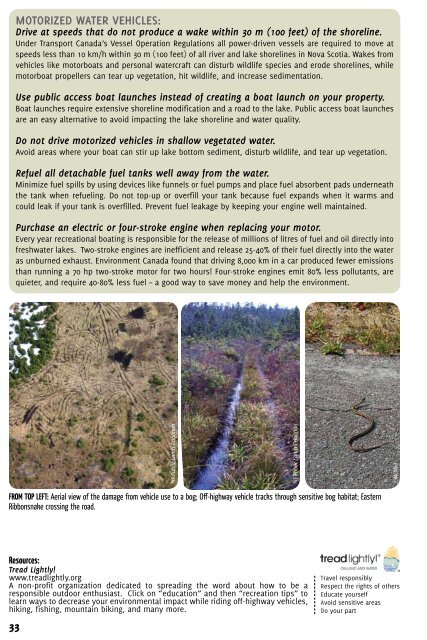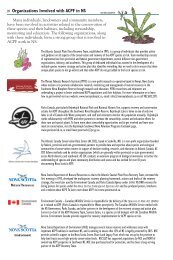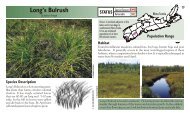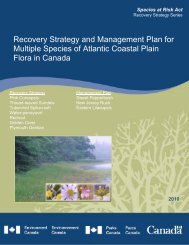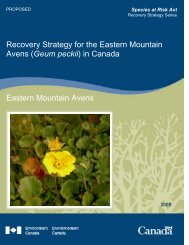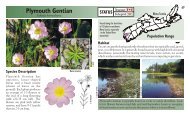Healthy Lakes and Wetlands For Tomorrow - Species at Risk
Healthy Lakes and Wetlands For Tomorrow - Species at Risk
Healthy Lakes and Wetlands For Tomorrow - Species at Risk
Create successful ePaper yourself
Turn your PDF publications into a flip-book with our unique Google optimized e-Paper software.
MOTORIZED WATER VEHICLES:<br />
Drive <strong>at</strong> speeds th<strong>at</strong> do not produce a wake within 30 m (100 feet) of the shoreline.<br />
Under Transport Canada’s Vessel Oper<strong>at</strong>ion Regul<strong>at</strong>ions all power-driven vessels are required to move <strong>at</strong><br />
speeds less than 10 km/h within 30 m (100 feet) of all river <strong>and</strong> lake shorelines in Nova Scotia. Wakes from<br />
vehicles like motorbo<strong>at</strong>s <strong>and</strong> personal w<strong>at</strong>ercraft can disturb wildlife species <strong>and</strong> erode shorelines, while<br />
motorbo<strong>at</strong> propellers can tear up veget<strong>at</strong>ion, hit wildlife, <strong>and</strong> increase sediment<strong>at</strong>ion.<br />
Use public access bo<strong>at</strong> launches instead of cre<strong>at</strong>ing a bo<strong>at</strong> launch on your property.<br />
Bo<strong>at</strong> launches require extensive shoreline modific<strong>at</strong>ion <strong>and</strong> a road to the lake. Public access bo<strong>at</strong> launches<br />
are an easy altern<strong>at</strong>ive to avoid impacting the lake shoreline <strong>and</strong> w<strong>at</strong>er quality.<br />
Do not drive motorized vehicles in shallow veget<strong>at</strong>ed w<strong>at</strong>er.<br />
Avoid areas where your bo<strong>at</strong> can stir up lake bottom sediment, disturb wildlife, <strong>and</strong> tear up veget<strong>at</strong>ion.<br />
Refuel all detachable fuel tanks well away from the w<strong>at</strong>er.<br />
Minimize fuel spills by using devices like funnels or fuel pumps <strong>and</strong> place fuel absorbent pads underne<strong>at</strong>h<br />
the tank when refueling. Do not top-up or overfill your tank because fuel exp<strong>and</strong>s when it warms <strong>and</strong><br />
could leak if your tank is overfilled. Prevent fuel leakage by keeping your engine well maintained.<br />
Purchase an electric or four-stroke engine when replacing your motor.<br />
Every year recre<strong>at</strong>ional bo<strong>at</strong>ing is responsible for the release of millions of litres of fuel <strong>and</strong> oil directly into<br />
freshw<strong>at</strong>er lakes. Two-stroke engines are inefficient <strong>and</strong> release 25-40% of their fuel directly into the w<strong>at</strong>er<br />
as unburned exhaust. Environment Canada found th<strong>at</strong> driving 8,000 km in a car produced fewer emissions<br />
than running a 70 hp two-stroke motor for two hours! Four-stroke engines emit 80% less pollutants, are<br />
quieter, <strong>and</strong> require 40-80% less fuel – a good way to save money <strong>and</strong> help the environment.<br />
NS Public L<strong>and</strong>s Coalition<br />
NS Public L<strong>and</strong>s Coalition<br />
J. McNeil<br />
FROM TOP LEFT: Aerial view of the damage from vehicle use to a bog; Off-highway vehicle tracks through sensitive bog habit<strong>at</strong>; Eastern<br />
Ribbonsnake crossing the road.<br />
Resources:<br />
Tread Lightly!<br />
www.treadlightly.org<br />
A non-profit organiz<strong>at</strong>ion dedic<strong>at</strong>ed to spreading the word about how to be a<br />
responsible outdoor enthusiast. Click on “educ<strong>at</strong>ion” <strong>and</strong> then “recre<strong>at</strong>ion tips” to<br />
learn ways to decrease your environmental impact while riding off-highway vehicles,<br />
hiking, fishing, mountain biking, <strong>and</strong> many more.<br />
33<br />
Travel responsibly<br />
Respect the rights of others<br />
Educ<strong>at</strong>e yourself<br />
Avoid sensitive areas<br />
Do your part


